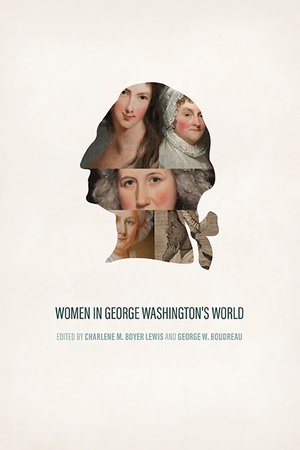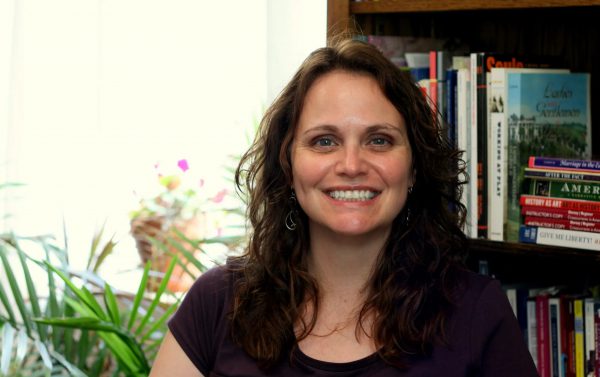
of “Women in George Washington’s World.”
Although women’s historians have written about women in the American Revolution since the 1970s, many people still think of the war as a men’s event.
Women in George Washington’s World (University of Virginia Press, 2022) aims to be part of a new wave of efforts to reframe the American Revolution as a war that heavily involved women. Published this month, the book is co-edited by Charlene Boyer Lewis ’87, Kalamazoo College professor of history and director of the American Studies and the Women, Gender and Sexuality programs. The book includes an essay written by Boyer Lewis on Peggy Arnold, the wife of infamous traitor Benedict Arnold.
“For too long when people think of the American Revolution, they think of men, they think of soldiers and they think of the guys in Philadelphia who signed the Declaration of Independence,” Boyer Lewis said. “This is part of the project to rethink and re-present the American Revolution as a war that included women, a war that affected women, a war that women affected.”
A 2018 symposium at George Washington’s Mount Vernon in Virginia about women and George Washington, where Boyer Lewis and her co-editor, George Boudreau, were both presenters, served as the inspiration for the book.
“It’s a collection of essays written by academic historians as well as public historians,” Boyer Lewis said. “We have people who are out in the museum world and historical societies contributing to this as well as academics, so it’s a broad range of kinds of historians. They were all wonderful and the book turned out to be exactly what we wanted it to be.”
Including public historians was part of an intentional effort to create a history book that was accessible to a general audience. Also key to that effort was a focus on story telling.

“Historians have to tell a good story along with a good argument or interpretation of the past,” Boyer Lewis said. “This was put out by an academic press and peer reviewed by scholars. Every essay meets scholarly academic standards, and at the same time, every single one of those chapters tell really good stories that I think people are going to enjoy reading.”
The essays feature famous women such as Martha Washington, Abigail Adams and Phyllis Wheatley, lesser-known women such as Elizabeth Willing Powel, and unknown women, including women enslaved by the Washington family. Boyer Lewis recounted a story of one such woman who ran away while Washington was president and was never caught despite his efforts to track her down.
“It was important to us to look at a wide variety of women in George Washington’s world,” Boyer Lewis said. “Women who loved him, women who cared for him and also women who challenged him and frustrated him.”
This is the first editing endeavor for Boyer Lewis, who is the author of two books, Elizabeth Patterson Bonaparte: An American Aristocrat in the Early Republic (University of Pennsylvania Press, 2012) and Ladies and Gentlemen on Display: Planter Society at the Virginia Springs, 1790-1860 (University of Virginia Press, 2001). She found the collaboration with Boudreau to be fruitful as they brought different strengths to the project, and the overall process to be surprisingly smooth.
“Everybody said, ‘No, you don’t want to edit a book, it’s like herding cats,’” Boyer Lewis said. “My contributors were wonderful so it went a lot more smoothly than I had thought. There was a lot of passion and commitment to this work that made it easier.”
That passion and commitment proved key when the COVID-19 pandemic hit mid-project.
“George and I had all these plans of being together in person and working on the book, and that didn’t happen,” Boyer Lewis said. “There were lots of phone calls, lots of zoom calls. There were archives that people needed to go and do research in that were closed.”
Even without COVID restrictions, research for the book was a complicated affair.
“The archives of the time were meant to preserve the records of men,” Boyer Lewis said. “We’re dealing with small amounts or almost non-existent records of women. Even somebody like Martha Washington, whom you would think there must be copious amounts of sources—she burned everything. So even piecing together her life can be a challenge, let alone the enslaved women who worked for the Washingtons. That is real detective work.”
National Archives Museum
online book talk
- Tuesday, July 26 from 1 to 2 p.m.
Women in George Washington’s World - Co-edited by Charlene Boyer Lewis, Kalamazoo College professor of history and director of the American Studies and the Women, Gender and Sexuality programs, and George W. Boudreau, historian of early Anglo-America and public history.
- Co-editors Boyer Lewis and Boudreau will discuss their book, a collection of essays examining women at the time of the American Revolution who had complex relationships with George Washington and the roles those women played in shaping the nation, with Lorri M. Glover, professor of history, Saint Louis University. View on YouTube
- Women in George Washington’s World is widely available for purchase.
Each subject presented her own challenges. Poet Phyllis Wheatley left many poems but few letters or other records. Although Abigail Adams left copious correspondence with her husband, John Adams, using those letters to analyze her relationship with and thoughts about George Washington is convoluted. Contributors writing about enslaved women went through the most “mental gymnastics,” Boyer Lewis said, to “sift through and find two sentences in a letter where a white slave owner is talking about the enslaved woman and get as much out of those sentences as they can.
“This book highlights how difficult women’s history is to do, yet how successfully it can be done.”
As a women’s historian, Boyer Lewis found the completed work reaffirms what she has known and taught for years—that women are an important part of history.
“When you use George Washington as the connection, and then you start looking at the women all around George Washington, it seems simple to say, but women are everywhere,” Boyer Lewis said. “They’re everywhere. Washington lived his life surrounded by women, and surrounded by women he listened to, who he was willing to be advised by. If we can show how much women mattered in George Washington’s life, then it will be a lot easier to make it clear how much women mattered everywhere else. If George Washington is having his life affected by women constantly, for better and for worse, women who worked with him and women who thwarted him, so did everybody else. It was just wonderful to have that reaffirmed for me that women are everywhere and they’re mattering everywhere.”
